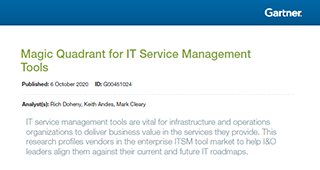Why is Knowledge Management so important to BMC and to our customers, and why has BMC Remedy Service Management Suite’s Knowledge Management earned the highest ratings in 4 out of 5 Use Cases in Gartner’s Critical Capabilities for IT Service Support Management Tools?
Digital transformation is rapidly broadening the range of technologies in use in the workplace. The enterprise is filling with new devices, new platforms, and new types of digitally-enabled services. In countless conversations with customers, we are hearing that Knowledge Management has never been more important to the success of the IT support organization.
In the past, the information technology base underpinning an enterprise was comparatively straightforward. Corporate applications were delivered from standardized datacenters, and accessed using desktop PCs. IT organizations selected their tools and platforms, and built their skill sets and support processes accordingly.
The digital enterprise of the modern era looks very different. With the rise of the Internet of Things, many business services are now underpinned by entirely new types of devices, frequently in areas of the business that were not previously digitally enabled. Big data systems drive new business opportunities. The datacenter has moved beyond virtualization, to a new hybrid of public and private cloud technologies. Mobile devices are ubiquitous.
Supporting this technological diversity presents a huge challenge for the IT Support organization. Unless the Service Desk is able to expand its scope of support, are more escalations to second and third line teams, which is expensive, and slows the resolution process. Knowledge Management is the best way to address this challenge. Done effectively, it can simultaneously enhance the organization’s efficiency in supporting core technologies, while providing a growing “long tail” of resources in support of the wider range of devices appearing across the enterprise. When they have access to the right knowledge resources, support agents can achieve more first-time resolutions even for unfamiliar devices, and organically develop a wider set of skills, simply by doing their job.
These benefits are not achievable if the knowledge tool is inferior or poorly integrated. Standalone tools frequently force the support agent to jump from one interface to another, often re-keying information between the two. This “swivel chair” effect reduces the efficiency of knowledge consumption and creation and may even make the knowledge search process so slow and uncertain that agents’ performance against their time targets gets worse instead of better. Poor integration also slows down the process of creating content, acting as a disincentive to do so, and hence reducing effective knowledge gathering.
BMC Remedy Service Management delivers knowledge automatically, contextually, at the point it is needed; adapting in real time to the information recorded by the agent. The agent does not have to switch between screens, or even instigate the search manually. Because knowledge is not just about articles, BMC Remedy Service Management also positions other relevant resources, such as related tickets and outages, in context of the agent’s work.
For knowledge authors, articles can be created directly from support tickets, removing the need to copy and paste information. The intuitive and powerful editor makes it easy to create elegant and appealing content, and assistive features help the author to avoid creating duplicate content.
Furthermore, full mobile support for both consumption and creation of knowledge ensures that field teams have full access to all of this functionality on supported Android and iOS devices.
The Service Desk Institute, in a report predicting the shape of the support organization in 2017, emphasized that Service Desks should transform into “innovation centres, rekindling curiosity with the latest technology and teaching the business how to harness cutting-edge equipment.” To deliver this vision, the knowledge tool needs to be collaborative; today’s digital services are not built using single technologies, so effective sharing of knowledge is vital to enable valuable content to be built and shared. BMC Remedy Service Management harnesses social collaboration to ensure that great teamwork can create great knowledge. It also provides the option to use the practices defined by the Knowledge Centered Support (KCS) framework, building collaborative knowledge management into the “day job” of the organization’s support professionals.
It is clear that pervasive knowledge creation and usage is critical to the success of a digital service organization. This is why we have substantially increased our investment into the Knowledge Management capabilities of BMC Remedy Service Management over the past several years. World-class Knowledge Management is a core, foundational component of our ITSSM suite. We believe this is reflected in the 2016 Gartner Critical Capabilities for IT Service Support Management tools, in which BMC Remedy Service Management Suite received the highest scores in Intermediate-Maturity, High-Maturity, Basic Digital Workplace ITSSM, and Digital Advanced Workplace ITSSM.
Gartner does not endorse any vendor, product or service depicted in its research publications, and does not advise technology users to select only those vendors with the highest ratings or other designation. Gartner research publications consist of the opinions of Gartner’s research organization and should not be construed as statements of fact. Gartner disclaims all warranties, expressed or implied, with respect to this research, including any warranties of merchantability or fitness for a particular purpose.
Read the rest of our series on Knowledge Management:
Knowledge Management Strategies






